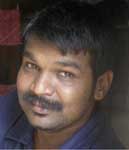|

Born 1970 in Karnataka,
Iranna obtained B.F.A. from the College of Visual Arts in Gulbarga and
M.F.A. from Delhi College of Art. Iranna is a recipient of National
Academy award in 1997 and the M.F.Hussain and Ram Kumar award. G.R
Iranna has been nominated from India for the ABPF Signature Art Prize
08, Singapore. His works are philosophical reflections, revolving around
the interactions and explorations of a man’s inner world with the
existential issues of today.
Through
his present sculpture he comments on human civilizational growth and its
intrinsic follies consisting of aggression and ideological
indoctrinations, violently inflicted upon human beings in the name of
territorial growth. Iranna’s
intention is to capture the trauma of
human kind.
“Iranna’s chosen vehicle of articulation is the allegorical tableau; an
idiom that offers its contents to the viewer with disarming candor, even
as it withholds many of the subtexts that would render them readable- so
investing its protagonists and situations with the quality of enigmatic
presence. Iranna takes advantage of the critical and even adversarial
stance that allegory permits, while also nourishing its potential for
all that cannot be decoded, cannot be named; the expressive and the
sensuous. It is a tribute to his ingenuity and tireless self-questioning
that he has perfected his allegorical art, for its roots lie in artistic
choices that were widespread to the point of being formulaic during his
student years. At that date, the styles of the Italian Trans-avant-garde
had won considerable favor with the votaries of the narrative and
allegorical option in Indian figuration; they had percolated to his
generation through the works of their immediate predecessors, many of
them associated with the influential Faculty of Fine Arts at the
Maharaja Sayaji Rao University, Baroda.
Iranna’s accomplishment, in his work during the first few years of the
21st century, was to extend his investment in the figure considerably,
in terms both of pictorial inventiveness and metaphorical charge. His
aims were twofold; first to consolidate the archetypal figure as bearer
of existential crisis and second, to restate the relationship between
this figure and a versatile ground characterized by sensuous plenitude
as well as menace. Iranna has also renewed his commitment to an obdurate
pictoriality; we must note his insistence on making images that place
stringent demand on the viewer, being resonant with a mythic
significance that lies beyond the parameters of everyday experience.
Previously, as we have seen, Iranna has made various approaches to the
heroic male figure; the body yogic and the body electric, the sublime
and the effulgent body, the body levitating in a trance. Now, the figure
is more flexible, even more amenable to riddle-like paradox than before,
even more resonant with the mandate of emancipation from circumstances.”
– Ranjit Hoskote
|
|
|
|